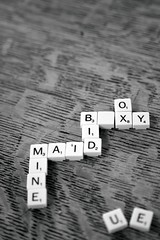Alternate Rules For Board Games
Posted by admin | Posted in Board Games | Posted on 11-09-2010
Tagged Under : Alternate, Board, Games, Rules
Alternate Rules For Board Games
Sometimes, when dedicated fans play a beloved game over and over again, they may start to grow a little weary of the same, traditional rules. They often look for new ways to play the game, either little ways to twist the rules, or a completely new approach to an already enjoyable game. Some of these alternate rules end up becoming rather popular and can give players completely new insights into the games that they already love.
One such game that was built out of alternate rules is Speed Scrabble. Abandoning the traditional board, Speed Scrabble plays out using all of the tiles from a traditional Scrabble set and works on the principle of players needing to use all of their tiles to build words as quickly as they can. 4 or 5 players are the ideal number for a Speed Scrabble game, for when it is considered that there are 100 tiles in a traditional Scrabble set, the number of tiles works out exactly so that each player will always have an equal number of tiles.
The rules of Speed Scrabble are the same as traditional Scrabble – only English words are allowed that are not proper nouns, abbreviations, or slang. Words in question must be voted upon by the group, unless a traditional Scrabble dictionary is handy. Blanks are allowed, but must represent the same letter for every word that it is a part of. One of the advantages of Speed Scrabble, however, is that at any point during the game, one can take all of the letters they have used so far and rearrange their entire board to make new words using the same letters. This often proves to be a winning strategy in the game. Speed Scrabble has proven itself to be a unique twist on the classic intelligence game and players looking for a change to their normal routine should consider giving this a try!
Other alternate rules for different board games are not always so extreme. Risk is a game that is often adapted to any certain player’s needs. While a popular game, Risk does draw some complaints, often from the lengthy period of time in which it takes to not only set up the board, but for each player to complete their turn.
One version of Risk does away with the lengthy set up time frame by making each player’s starting countries end up completely random. Another version removes the use of dice from the game and proposes a 1 to 1 exchange rate for armies. By sacrificing one of your own armies, you destroy one of your opponent’s. This allows no player to be the victim of simple bad luck and provides for an even more strategic approach to the game. This version also places more importance on the cards drawn during the game, allowing them to be redeemed immediately instead of having to wait for a set to be drawn. This allows players to be even more aggressive in their approach to their respective strategies.
By simply taking any game and applying alternate rules, the game can almost be completely re-invented and provide a fun, new experience for everyone involved.
Victor Epand is an expert consultant for board games, chess boards, and dungeons and dragons miniatures. You will find all these things and more if you visit alternate rules board games, chess boards, and dungeons and dragons miniatures.
I wrote a guest post on this media site, if you wanna check it out here. www.newmediaaddict.com So um hey……haven’t seen you in ummm 3 days.. Anyways….going to do things…..yep….Send your Philip DeFranco mail to 13428 Maxella Avenue #286 Marina Del Rey, CA 90292 Email your business inquiries to: business [at]phillyd.tv Check out everything else that mattered to Phil at PhillyD.tv To Download Music featured in the Vloggity go to www.urbandelights.net
Video Rating: 4 / 5

